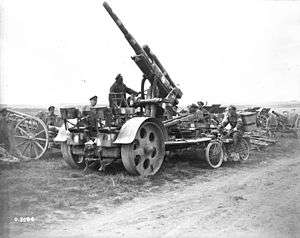8.8 cm Flak 16
The 8.8 cm Flak 16 was a German 8.8 cm anti-aircraft gun from World War I, forerunner of the 8,8 cm FlaK/PaK Flak 18/36/37 of World War II. Its contemporary name was the 8,8 cm K.Zugflak L/45.
| 8.8 cm Flak 16 | |
|---|---|
 8.8 cm Flak 16 cannon | |
| Type | Anti-aircraft gun |
| Place of origin | German Empire |
| Service history | |
| In service | 1917-1918 |
| Used by | |
| Wars | World War I |
| Production history | |
| Designer | Krupp |
| Designed | 1916 |
| Manufacturer | Krupp |
| No. built | 169 |
| Specifications | |
| Mass | Transport: 7,300 kg (16,100 lb) Combat: 3,100 kg (6,800 lb) |
| Barrel length | 3.9 m (12 ft 10 in) L/45[1] |
| Shell | Fixed QF |
| Shell weight | 9.4 kg (20 lb 12 oz) |
| Caliber | 88 mm (3.46 in) |
| Breech | Horizontal sliding-block |
| Recoil | Hydro-pneumatic |
| Carriage | Four-wheeled cruciform outriggers |
| Elevation | 0° to +70° |
| Traverse | 360°[1] |
| Rate of fire | 10 rpm |
| Muzzle velocity | 785 m/s (2,575 ft/s) |
| Maximum firing range | Horizontal: 10.8 km (6.7 mi) Vertical: 6,850 m (22,470 ft)[1] |
| Wikimedia Commons has media related to 8.8 Kw Flak 1916. |
Development
Early anti-aircraft artillery guns of World War I were primarily adaptations of existing medium-caliber weapons, mounted to enable fire at higher angles. By 1915, the German military command realized that these were useless for anything beyond deterrence, even against vulnerable balloons and slow-moving aircraft.[2] With the increase of aircraft performance, many armies developed dedicated AA guns with a high muzzle velocity – allowing the projectiles to reach greater altitudes. The first such German gun, the Flak 16, was introduced in 1917, using the 88 mm caliber, common in the Kaiserliche Marine.[2]
References
- Fleischer, Wolfgang (February 2015). German Artillery:1914-1918. Barnsley. p. 94. ISBN 9781473823983. OCLC 893163385.
- Westermann, Edward B. (2005–2009) [2001]. Flak: German Anti-aircraft Defenses 1914-1945. Modern War Studies. University Press of Kansas. pp. 19, 36–38, 44, 53, 58, 83, 90, 108, 128–129. ISBN 9780700614202.